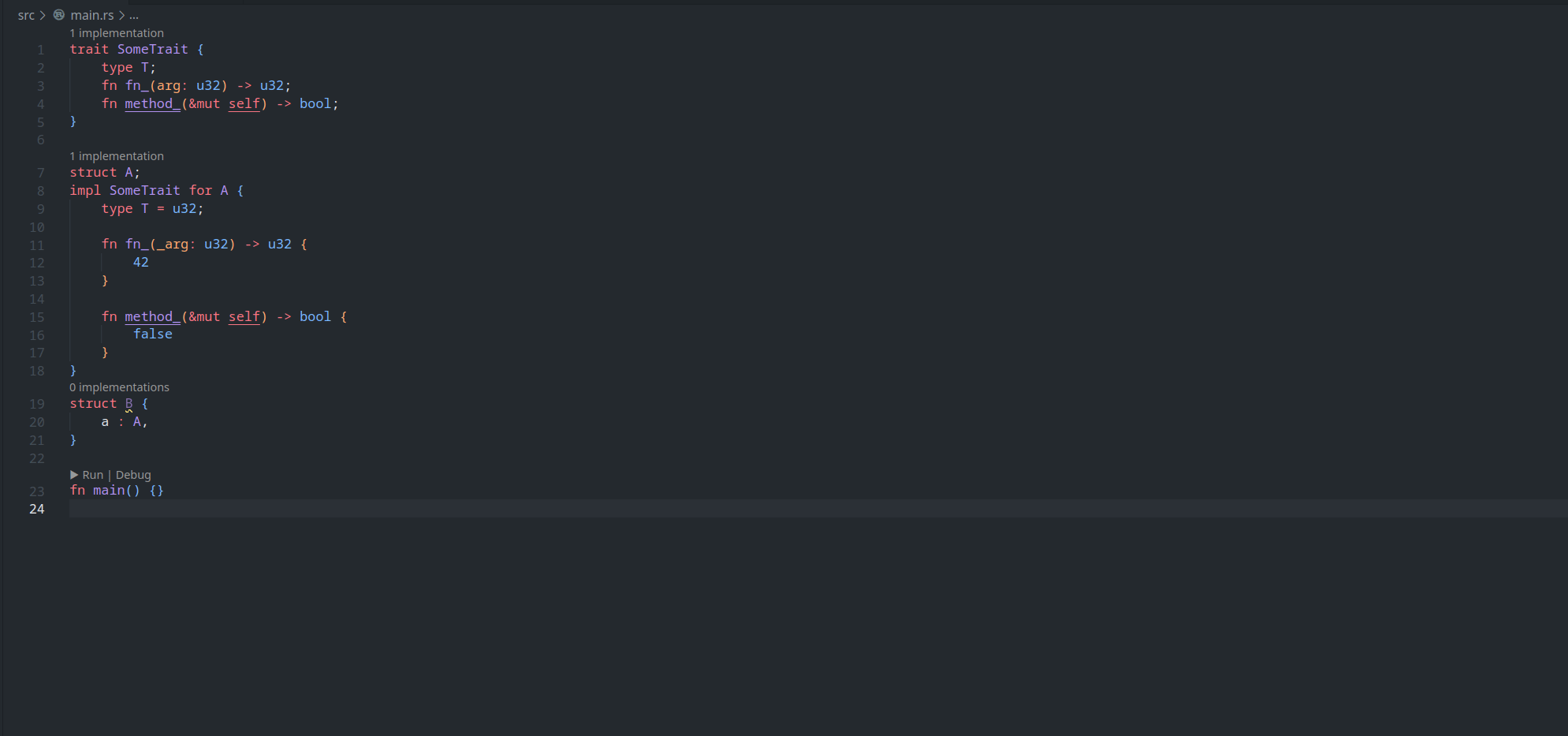feature : assist delegate impl
This PR ( fixes#14386 ) introduces a new IDE assist that generates a trait impl for a struct that delegates a field. This is a draft because the current `ide_db::path_transform::PathTransform` produces some unwanted results when it deals with extern crates, an example of which I attach as a GIF.
GIFs :
1. A general case

2. A case where `ide_db::path_transform::PathTransform` fails to correctly resolve a property ( take `Allocator` as an example ) to its full path, thus causing an error to occur. ( Not to even mention that resolving this causes another error `use of unstable library feature 'allocator_api'` to occur

Remove scope_for_def calls as the definition have been removed entirely.
As a result of this change the problem with false path resolutions has been solved.
Lower const params with a bad id
cc #7434
This PR adds an `InTypeConstId` which is a `DefWithBodyId` and lower const generic parameters into bodies using it, and evaluate them with the mir interpreter. I think this is the last unimplemented const generic feature relative to rustc stable.
But there is a problem: The id used in the `InTypeConstId` is the raw `FileAstId`, which changes frequently. So these ids and their bodies will be invalidated very frequently, which is bad for incremental analysis.
Due this problem, I disabled lowering for local crates (in library crate the id is stable since files won't be changed). This might be overreacting (const generic expressions are usually small, maybe it would be better enabled with bad performance than disabled) but it makes motivation for doing it in the correct way, and it splits the potential panic and breakages that usually comes with const generic PRs in two steps.
Other than the id, I think (at least I hope) other parts are in the right direction.
fix: implemeted lifetime transformation fot assits
A part of https://github.com/rust-lang/rust-analyzer/issues/13363
I expect to implement transformation of const params in a separate PR
Other assists and a completion affected:
- `generate_function` currently just ignores lifetimes and, consequently, is not affected
- `inline_call` and `replace_derive_with...` don't seem to need lifetime transformation
- `trait_impl` (a completion) is fixed and tested
internal: Migrate some assists to use the structured snippet API
Migrates the following assists:
- `add_missing_impl_members`
- `extract_type_alias`
As an additional requirement, these assists are also migrated to use the mutable AST API, since otherwise there would be overlapping `Indel` spans
The change updates the logic to determine if a function parameter is
valid for replacing the type param with the trait implementation.
First all usages are determined, to check if they are used outside the function
parameter list. If an outside reference is found, e.g. in body, return type or
where clause, the assist is skipped. All remaining usages only appear in the
function param list. For each usage the param type is checked to see if
it's valid.
**Please note** the logic currently follows a heuristic and may not cover
all existing parameter declarations.
* determine valid usage references by checking ancestors (on AST level)
* split test into separate ones
Fix edits for `convert_named_struct_to_tuple_struct`
Two fixes:
- When replacing syntax nodes, macro files weren't taken into account. Edits were simply made for `node.syntax().text_range()`, which would be wrong range when `node` is inside a macro file.
- We do ancestor node traversal for every struct name reference to find record expressions/patterns to edit, but we didn't verify that expressions/patterns do actually refer to the struct we're operating on.
Best reviewed one commit at a time.
Fixes#13780Fixes#14927
Previously we didn't verify that record expressions/patterns that were
found did actually point to the struct we're operating on. Moreover,
when that record expressions/patterns had missing child nodes, we would
continue traversing their ancestor nodes.
This removes an existing generic param from the `GenericParamList`. It
also considers to remove the extra colon & whitespace to the previous
sibling.
* change order to get all param types first and mark them as mutable
before the first edit happens
* add helper function to remove a generic parameter
* fix test output
This adds a new assist named "replace named generic with impl" to move
the generic param type from the generic param list into the function
signature.
```rust
fn new<T: ToString>(input: T) -> Self {}
```
becomes
```rust
fn new(input: impl ToString) -> Self {}
```
The first step is to determine if the assist can be applied, there has
to be a match between generic trait param & function paramter types.
* replace function parameter type(s) with impl
* add new `impl_trait_type` function to generate the new trait bounds with `impl` keyword for use in the
function signature
fix: assists no longer break indentation
Fixes https://github.com/rust-lang/rust-analyzer/issues/14674
These are _ad hoc_ patches for a number of assists that can produce incorrectly indented code, namely:
- generate_derive
- add_missing_impl_members
- add_missing_default_members
Some general solution is required in future, as the same problem arises in many other assists, e.g.
- replace_derive_with...
- generate_default_from_enum...
- generate_default_from_new
- generate_delegate_methods
(the list is incomplete)
Restrict "sort items" assist for traits & impls
This restricts the "sort items alphabetically" assist when the selection is inside a `Impl` or `Trait` node & intersects with one of the associated items.
It re-orders the conditional checks of AST nodes in the `sort_items` function to check for more specific nodes first before checking `Trait` or `Impl` nodes. The `AssistContext` is passed into the `add_sort_methods_assist` function to check if the selection intersects with any inner items, e.g. associated const or type alias, function. In this case the assist does not apply.
Fixes: #14516
This fixes the applicability of the "sort items alphabetically" assist
when the selection is inside a `Trait` or `Impl`. It's now tested if the
selection is inside or overlaps with an inner node, e.g. associated
const or type alias, function.
internal: Implement Structured API for snippets
Fixes#11638 (including moving the cursor before the generated type parameter)
Adds `add_tabstop_{before,after}` for inserting tabstop snippets before & after nodes, and `add_placeholder_snippet` for wrapping nodes inside placeholder nodes.
Currently, the snippets are inserted into the syntax tree in `SourceChange::commit` so that snippet bits won't interfere with syntax lookups before completing a `SourceChange`.
It would be preferable if snippet rendering was deferred to after so that rendering can work directly with text ranges, but have left that for a future PR (it would also make it easier to finely specify which text edits have snippets in them).
Another possible snippet variation to support would be a group of placeholders (i.e. placeholders with the same tabstop number) so that a generated item and its uses can be renamed right as it's generated, which is something that is technically supported by the current snippet hack in VSCode, though it's not clear if that's a thing that is officially supported.
MIR episode 2
This PR adds:
1. `need-mut` and `unused-mut` diagnostics
2. `View mir` command which shows MIR for the body under cursor, useful for debugging
3. MIR lowering for or-patterns and for-loops
Handle trait alias definitions
Part of #2773
This PR adds a bunch of structs and enum variants for trait aliases. Trait aliases should be handled as an independent item because they are semantically distinct from traits.
I basically started by adding `TraitAlias{Id, Loc}` to `hir_def::item_tree` and iterated adding necessary stuffs until compiler stopped complaining what's missing. Let me know if there's still anything I need to add.
I'm opening up this PR for early review and stuff. I'm planning to add tests for IDE functionalities in this PR, but not type-related support, for which I put FIXME notes.
Beginning of MIR
This pull request introduces the initial implementation of MIR lowering and interpreting in Rust Analyzer.
The implementation of MIR has potential to bring several benefits:
- Executing a unit test without compiling it: This is my main goal. It can be useful for quickly testing code changes and print-debugging unit tests without the need for a full compilation (ideally in almost zero time, similar to languages like python and js). There is a probability that it goes nowhere, it might become slower than rustc, or it might need some unreasonable amount of memory, or we may fail to support a common pattern/function that make it unusable for most of the codes.
- Constant evaluation: MIR allows for easier and more correct constant evaluation, on par with rustc. If r-a wants to fully support the type system, it needs full const eval, which means arbitrary code execution, which needs MIR or something similar.
- Supporting more diagnostics: MIR can be used to detect errors, most famously borrow checker and lifetime errors, but also mutability errors and uninitialized variables, which can be difficult/impossible to detect in HIR.
- Lowering closures: With MIR we can find out closure capture modes, which is useful in detecting if a closure implements the `FnMut` or `Fn` traits, and calculating its size and data layout.
But the current PR implements no diagnostics and doesn't support closures. About const eval, I removed the old const eval code and it now uses the mir interpreter. Everything that is supported in stable rustc is either implemented or is super easy to implement. About interpreting unit tests, I added an experimental config, disabled by default, that shows a `pass` or `fail` on hover of unit tests (ideally it should be a button similar to `Run test` button, but I didn't figured out how to add them). Currently, no real world test works, due to missing features including closures, heap allocation, `dyn Trait` and ... so at this point it is only useful for me selecting what to implement next.
The implementation of MIR is based on the design of rustc, the data structures are almost copy paste (so it should be easy to migrate it to a possible future stable-mir), but the lowering and interpreting code is from me.